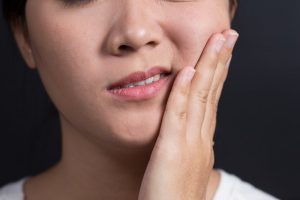 Bruxism (teeth grinding) at night is a common but serious problem. If the issue goes on for an extended period of time, it may lead to a range of unpleasant symptoms, such as headaches, a sore jaw, and premature wear and tear on the teeth. If you suspect that you are grinding your teeth while you are asleep, it’s important that you seek professional help! Your dentist or oral surgeon in Houston will first seek to identify the cause of your bruxism and then design a treatment plan that is tailored to your specific needs.
Bruxism (teeth grinding) at night is a common but serious problem. If the issue goes on for an extended period of time, it may lead to a range of unpleasant symptoms, such as headaches, a sore jaw, and premature wear and tear on the teeth. If you suspect that you are grinding your teeth while you are asleep, it’s important that you seek professional help! Your dentist or oral surgeon in Houston will first seek to identify the cause of your bruxism and then design a treatment plan that is tailored to your specific needs.
Causes of Teeth Grinding
Some common causes of nighttime teeth grinding include:
- Stress. A high-pressure job, family problems, or other issues may manifest themselves in bruxism.
- Sleep disorders. Sleep apnea and other conditions that affect the quality of your rest may contribute to bruxism.
- Malocclusion. A malocclusion, or a misaligned bite, affects the way the teeth fit together and can lead to habitual teeth grinding.
- Daily habits. Alcohol consumption (particularly close to bedtime), tobacco use, and even large doses of caffeine have been connected to bruxism.
- TMJ disorder (TMD). The temporomandibular joints are what join your mandible to the rest of your skull. When they’re overworked or otherwise damaged, bruxism can result.
In order to discover if one of the above is causing your bruxism, your dentist or Houston oral surgeon will perform a thorough evaluation of your mouth and orofacial structures. They may also ask you questions about your medical history and lifestyle so they can get a clear idea of the factors that are contributing to your problem. Once they pinpoint the cause of the teeth grinding, they can recommend a treatment.
Treatments for Nighttime Bruxism
Here are a few ways in which it might be possible to stop bruxism:
- Lifestyle changes. Something as simple as cutting back on caffeine or alcohol may relieve your bruxism. You may also have to seriously consider adjusting your daily routine so you have more time to relax.
- Facial massage. Massaging the jaw muscles may help them to relax so you are less likely to grind your teeth at night.
- A custom oral appliance. A custom oral appliance may stop the bruxism and even help to address disorders like obstructive sleep apnea.
- Orthodontic treatment. Braces can correct a misaligned bite so your teeth fit together better, which can relieve stress on your jaw and put an end to your bruxism.
- Surgery. In rare cases, TMD is caused by internal structural issues, in which case surgery may be the only viable treatment option. Your dentist may refer you to oral surgeons in Houston who are qualified to help you.
Do you suffer from nighttime teeth grinding? Figuring out the cause of your problem is the first step toward correcting it and enjoying a healthier, less painful life.
About Your Houston Oral Surgeons
Drs. Steve Koo and Thomas Weil are both experienced oral surgeons who are proud to provide top-notch care to Houston residents. If you would like to find out if they can help you find relief from your teeth grinding, contact our office at 713-783-5560.

